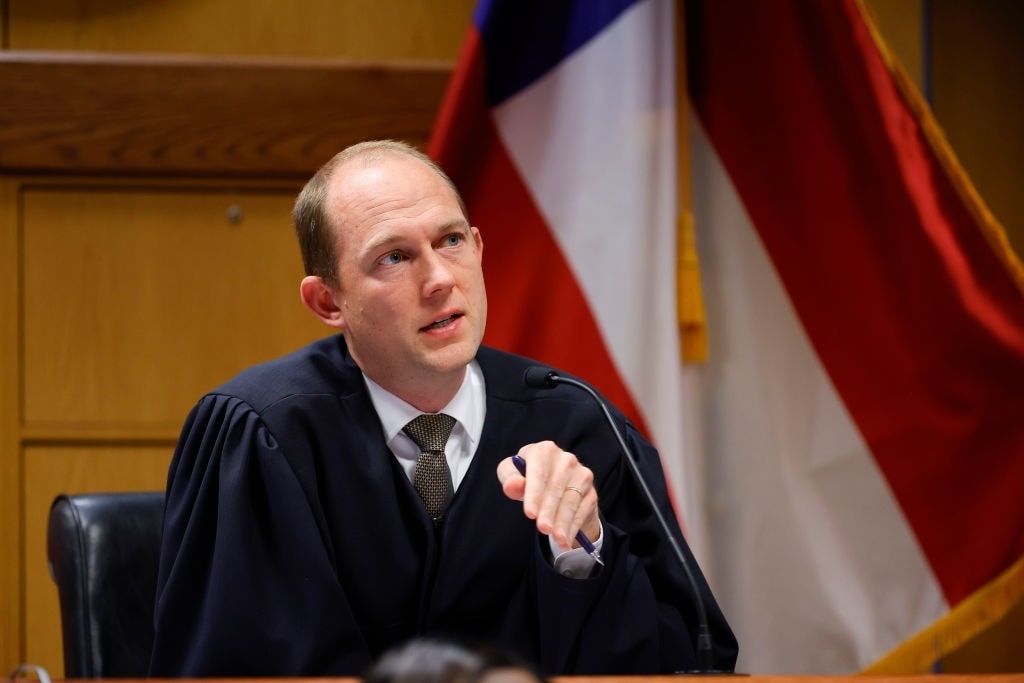The case in Fulton County, Georgia, against former President Donald Trump and his co-defendants will go ahead, although perhaps with a different starting line-up. Judge Scott McAffee ruled on March 15 that District Attorney Fani Willis and her office must step away from the trial or her handpicked prosecutor, Mr. Nathan Wade, must resign. Mr. Wade has resigned in response.
Trump and others are facing a bevy of charges related to their alleged actions around the 2020 presidential election. Just one day before this ruling, the same judge tossed six of the counts against the defendants but then surprised many by stating that – despite all the accusations and evidence against Ms. Willis, who is responsible for bringing this prosecution – the case could continue.
We spoke with Liberty Nation Legal Affairs Editor Scott D. Cosenza, Esq. to examine the details and understand what the ruling means in practice.
Mark Angelides: Could you summarize what Judge McAffee determined for us?
Scott D. Cosenza: McAfee ruled the defendants challenging the indictments did not meet their burden, showing that Ms. Willis had an actual conflict of interest. The judge explained: “Disqualification of a prosecutor due to a conflict of interest is thus not a creature of statute so much as it is a judicial remedy recognized by our appellate courts…” He cited the district attorney’s testimony as convincing evidence that her decision to indict and prosecute the case was not motivated by financial gain, and he ruled that nothing Ms. Willis has done so far has unfairly prejudiced the defendants.
Then McAfee explained that just because no impropriety had been convincingly proven, it didn’t mean the prosecution was without legal trouble. He wrote about how the appearance of impropriety might demand disqualification. The judge found much to be desired from the DA and her lover/appointee, and he ruled that they could not continue as they had been. Willis would either have to remove herself and her office, or Wade would have to resign.
Mark: I’ve seen several media outlets spinning that the judge ruled that Fani Willis “did not” have a conflict of interest. I believe this isn’t quite right, though. Is the Fourth Estate trying to bury the rebuke against Ms. Willis?

Judge Scott McAffee (Photo by Alex Slitz-Pool/Getty Images)
Scott: She’s getting that home team treatment from progressive media types, to be sure. McAfee ruled the defendants didn’t prove an actual conflict to the required standard, not that there wasn’t one. It’s a high standard the judge has a duty to maintain, but he never exonerated her, and he was quite critical. Judge McAfee wrote that she had a “tremendous lapse in judgment” and called out her “unprofessional manner.”
Mark: The ruling is a spicy summary of the district attorney’s conduct – specifically her “playing the race card” when she denounced what now appears to be a valid appeal from the church pulpit. Was this a self-inflicted wound?
Scott: Yes, it is – much as the entire circus is a self-inflicted wound by progressives in service of defeating Trump’s candidacy. Suppose they had only left him alone. If Fani Willis had only kept her mouth shut and kept her letter to God between herself and the Almighty, she would probably have won this motion – but pride goeth before the fall.
Mark: Law Professor Johnathan Turley suggested the ruling was akin to finding two bank robbers in a safe and only prosecuting one. What’s your analysis?
Scott: I enjoyed that phrasing, but Judge McAfee’s decision is defensible. His job was to weigh the evidence presented against the standard the Georgia Supreme Court articulated, not “do what’s right” or what seems reasonable.
Mark: Let’s get down to the legal stuff. Mr. Wade has resigned, and Ms. Willis has accepted. Is this the end of the Fani Willis soap opera, or did the judge’s decision leave room for Trump and his co-defendants to seek relief elsewhere?
Scott: Early reports indicate a number of the co-defendants, including Mr. Trump, will appeal this ruling and hope for a complete disqualification imposed by a higher court. My initial assessment is any appeal is likely to fail. Trial judges are afforded broad discretion in these types of matters as the administration of justice demands. If attorneys could challenge each motion ruling to the state supreme court before trial, well-funded defendants could forestall a trial in perpetuity. That doesn’t mean the issue would be forever dead. If any defendant was convicted, the conflict of interest alleged would be considered when granting an appeal.
Mark: I think the question that all interested observers want to be answered is this: Either Wade and Willis lied on the stand, or the other witnesses did; will anyone pursue perjury charges, and if so, against whom?
Scott: Georgia Attorney General Chris Carr would be the natural choice. He’s a Republican, which would give him added incentive to go after Willis and a built-in rallying cry for her defense. Ms. Willis could also be prosecuted by her replacement if she loses a bid for re-election. The same is true for Mr. Wade. Another thing is true for both – they might have another problem just as large. An attorney needs one thing to work: a license to practice. I suspect the State Bar of Georgia will be addressing Wade’s and Willis’ testimony, too, and the result will be some damaging sanction if not disbarment.
No comments:
Post a Comment